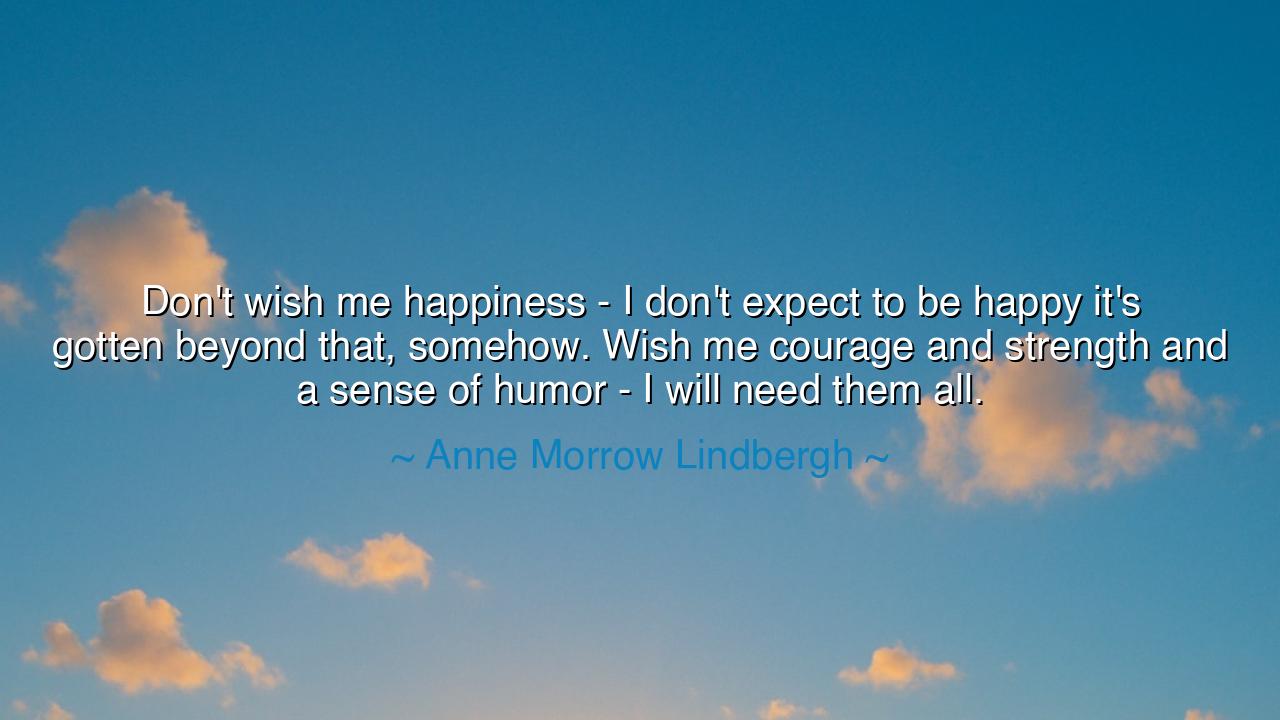
Don't wish me happiness - I don't expect to be happy it's gotten
Don't wish me happiness - I don't expect to be happy it's gotten beyond that, somehow. Wish me courage and strength and a sense of humor - I will need them all.






In the quiet voice of one acquainted with both love and loss, Anne Morrow Lindbergh once wrote: “Don’t wish me happiness — I don’t expect to be happy, it’s gotten beyond that, somehow. Wish me courage and strength and a sense of humor — I will need them all.” These words, spoken from the depths of human experience, are not a lament but a revelation. They come from a woman who had walked through both the radiance of triumph and the valley of unspeakable sorrow, and in doing so, had learned that life’s true treasures are not comfort and cheer, but courage, strength, and humor — the sacred trinity that allows the soul to endure and still shine amid the shadows.
Anne Morrow Lindbergh, wife of the famed aviator Charles Lindbergh, was no stranger to the extremes of human experience. She soared above the clouds as one of the first women to earn a glider pilot’s license, yet she also endured the unbearable — the kidnapping and death of her infant son, a tragedy that shocked the world and carved its mark upon her spirit forever. From this crucible of joy and anguish, she came to see life not as a quest for endless happiness — that fleeting and fragile condition — but as a journey of endurance, meaning, and grace. Her words are the voice of one who has faced the tempest and found, within herself, the steady light of fortitude.
When she says, “Don’t wish me happiness,” she rejects the illusion that happiness is a permanent state, or even a worthy goal for the soul that has seen much of the world’s suffering. Happiness, she implies, is a visitor — it comes and goes with the seasons of life. But courage is a companion, strength a staff, and humor a shield. These are the tools of survival, the instruments of wisdom that enable one to meet life not with bitterness, but with dignity. For when one has lived long enough, one learns that joy is not found in the absence of pain, but in the resilience to face it.
The ancients understood this truth well. Epictetus, the Stoic philosopher, taught that we cannot control what happens to us, but only how we respond. In this, he spoke the same wisdom as Lindbergh: that happiness cannot be commanded, but courage can be cultivated. And Job, the figure of endurance in the sacred texts, did not seek happiness in his trials, but the strength to endure them with faith. From generation to generation, the wise have known that it is inner resilience, not outer fortune, that defines the human spirit.
There is an ancient power, too, in a sense of humor — the ability to laugh, even softly, amid adversity. Humor, in Lindbergh’s vision, is not frivolity; it is a kind of spiritual courage, a refusal to let sorrow have the final word. The soldier who jokes on the battlefield, the mother who smiles through exhaustion, the elder who laughs at life’s ironies — all of them wield humor as an act of defiance against despair. To laugh when one might weep is to assert that the soul remains free. It is, as the ancients said, to “laugh at fate” — not in denial, but in mastery.
Consider the story of Helen Keller, who, though deaf and blind, filled the world with her laughter and wisdom. She did not seek happiness in the conventional sense; she sought purpose, learning, and light. Her joy came not from ease, but from overcoming — from finding strength in limitation and grace in persistence. Like Anne Morrow Lindbergh, she understood that the true measure of a life is not how much happiness one gathers, but how much courage one shows in the gathering of it.
So, my children of the future, take this lesson to heart: Do not chase happiness as if it were the sun. Seek instead the flame that burns within. Wish not for an easy path, but for courage to walk the hard one. Wish not for the absence of sorrow, but for strength to carry it with honor. And above all, cultivate a sense of humor, for laughter is the soul’s rebellion against despair — a quiet proof that even in darkness, the human spirit remains unconquered.
For life, as Lindbergh learned and as all wise souls must learn, is not a tale of perpetual joy. It is a journey of rising and falling, of losing and finding, of loving even in pain. And those who meet it with courage, strength, and humor — they do not merely survive; they transcend. They become as stars to the weary, shining not because the night is gone, but because they have learned to glow within it.






AAdministratorAdministrator
Welcome, honored guests. Please leave a comment, we will respond soon